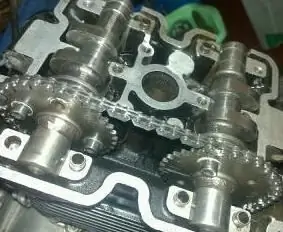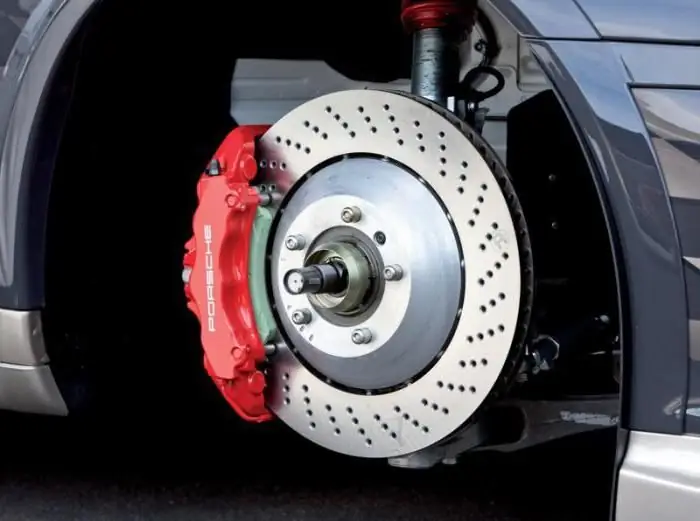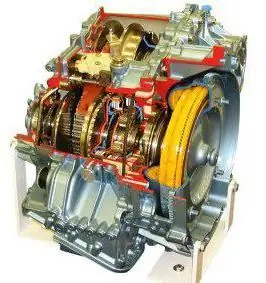2026 Author: Erin Ralphs | [email protected]. Last modified: 2025-01-22 21:14:14
A compressor is installed on all trucks manufactured by Kama. KamAZ 5320 is no exception. This element not only pumps air, but is also a source of accumulation of oil and moisture in the system. Therefore, for its normal operation, an additional moisture separator (KamAZ) is installed. The principle of operation, its device and varieties - later in our article.

About the braking system
All modern trucks now use a pneumatic drive system. It is also a source of compressed air for other process units. The use of the pneumatic system is determined by its high reliability, versatility and efficiency.
This construction has the same structure. It definitely includes a compressor. KamAZ is also equipped with receivers, pipelines, actuators and valves. In addition, the device of this system includes a dehumidifier. KAMAZ (Euro-3)equipped with it at the factory.

Destination
This element performs the function of removing oil and moisture, the presence of which can greatly affect the further operation of the compressor. By the way, it is the basis of any KamAZ brake system. It is through it that high-pressure air is injected.
However, there are elements in the system that need lubrication. Therefore, during operation, air accumulates in the middle of the device. And in view of the fact that oxygen for the system is taken from the atmosphere, it contains a certain percentage of moisture. Its presence in highways is simply unacceptable. The slightest drops of water settling on the surface of the valves quickly disable the compressor. KamAZ will slow down badly. Also, the presence of moisture accelerates corrosion processes. Outwardly, these factors are extremely difficult to notice, this is possible only when the emergency air pressure lamp lights up on the instrument panel.

Therefore, the design provides for a moisture-oil separator. KAMAZ, equipped with such a device, works in any conditions, regardless of the humidity in the street. It, passing through this device, is cleaned of oil and dried from moisture. Only after that it penetrates the receivers, where it is then sent to the actuators.
It is worth noting that the device cannot 100 percent clean the air of water and oil. Some percentage still remains in it. The receiver itself serves as an additional filter. Getting into them from pipelines,the air expands. At the same time, its temperature drops. And the remaining moisture condenses, settling on the walls of the tank. However, during long-term operation, experts recommend that the system be prevented by manually opening a special bleed valve.
Varieties
Today, KamAZ's water separator can be of two types: with RFE - built-in air pressure regulator or without it. These devices have the same purpose. However, their design is different. It is believed that devices with a built-in air pressure regulator provide more reliable operation of the pneumatic system. In addition, a radiator may be present in their design. Such elements use a combined type of air filtration - thermal and simply dynamic. The KamAZ dehumidifier without a radiator has only the last type of dehumidification. The element itself is a thin-walled finned tube, rolled into 5-6 turns.

Heating method
The filter-drier also differs in the method of heating. Depending on it, it can be electrical or mechanical. The design of devices of the first type provides for the presence of a built-in heating element. It releases the valves during winter operation. As for devices with mechanical heating, they operate on the energy of hot air. They also have anti-freeze valves in their design. They ensure the smooth operation of the system until the moment of release.
Device
Regardless of the type of data deviceelements are the same. At the heart of the filter-moisture separator has a metal housing with a guide vane and a moisture discharge valve. There are also additional valves here: a safety valve that ensures uninterrupted operation of the device when moisture freezes in the radiator and a return valve. The latter prevents the pressurized air from flowing back from the system to the compressor.
It is worth noting that the KamAZ moisture-oil separator, depending on the type of construction, has different condensate collection valves. On units without an air pressure regulator, this is the diaphragm spool version. It opens due to the discharge of air when the regulator is activated. As for the device with RFE, their design provides for one spring-type valve. It opens at the same time as the pressure regulator.
How does a KamAZ water separator with a regulator work?
The algorithm of the device has some peculiarities in the moisture collection mechanism. The compressor, pumping air, directs it through pipelines to the radiator. There it is dried and cooled. The air then enters the spiral channel located between the dehumidifier housing and the regulator. Here it goes through a cleaning process. Then, through the check valve, it enters the system again, but in a form suitable for operation.
Moisture itself at this time accumulates at the bottom of the apparatus. Having reached the extreme value, the condensate is removed. At the same time, the regulator valve opens, which in turn activates the dehumidification valve. At this time, the radiator is purged. Inside it is cleaned allhigh pressure water moisture.

Problems at work
They may occur in winter. At negative temperatures, during a long downtime, the relief valve may simply freeze. Then the pressure regulator works as a safety element, providing pressure relief when a critical level is reached. However, when the compressor is started, hot air enters the dehumidifier. KAMAZ, working at idle for about 5-10 minutes, will be suitable for operation, since this air at its temperature completely warms the valve and restores its operation.

Benefits
As for the advantages of using devices with a pressure regulator, here it should be noted the high efficiency of moisture removal. A conventional device without a regulator, especially in winter, is not able to completely clean the air of oil and moisture due to poor valve operation. This greatly reduces the efficiency of the air brake system.
In a device with a regulator, the removal of moisture is accompanied by flushing the radiator and housing under pressure - the moisture evaporates and is perfectly discharged into the atmosphere. Therefore, before installing a moisture separator on KamAZ, you need to understand the principle of operation of both types of elements. As you can see, the most suitable option is with an air pressure regulator. This is installed on most foreign cars. Therefore, its presence in the domestic KamAZ will not be superfluous at all.

Operating Rules
During use, this item requires minimal maintenance. But we will note several features, the knowledge of which will significantly extend the life of the moisture-oil separator. First, you need to install it correctly. The drain hose must point straight down. So, the collected condensate will be straight and freely discharged to the outside. If the fitting is moved to the side, even at high pressure, some moisture will remain, which will provoke corrosion processes inside the elements.
Also do not forget about the tightness of the system. If a used separator is installed, it is advisable to purchase a repair kit and change the sealing elements. Otherwise, this device has high reliability and efficiency, protecting the rubber diaphragms of the brake chambers from the harmful effects of oil, and the valves from corrosion and freezing in winter.
Faulty it can only be in case of depressurization. For example, if he began to "poison" the air often. In this case, the problem is solved by purchasing a repair kit. It includes a set of springs, sealing rubber rings and cuffs. By the way, if the latter malfunctions, the device constantly “hisses”, letting part of the air out under pressure.
Recommended:
Engine gas distribution mechanism: device, principle of operation, purpose, maintenance and repair

Timing belt is one of the most critical and complex components in a car. The gas distribution mechanism controls the intake and exhaust valves of an internal combustion engine. On the intake stroke, the timing belt opens the intake valve, allowing air and gasoline to enter the combustion chamber. On the exhaust stroke, the exhaust valve opens and exhaust gases are removed. Let's take a closer look at the device, the principle of operation, typical breakdowns and much more
Crankshaft - what is it? Device, purpose, principle of operation

The crankshaft is one of the main elements of the engine. It is part of the crank mechanism. It has a complex device. What is this mechanism? let's consider
ABS system. Anti-blocking system: purpose, device, principle of operation. Bleeding brakes with ABS

Not always an inexperienced driver manages to cope with the car and quickly reduce the speed. You can prevent skidding and blocking of the wheels by intermittently applying the brake. There is also an ABS system, which is designed to prevent dangerous situations while driving. It improves the quality of grip with the roadway and maintains the controllability of the car, regardless of the type of surface
The principle of operation of the variator. Variator: device and principle of operation

The beginning of the creation of variable programs was laid in the last century. Even then, a Dutch engineer mounted it on a vehicle. After such mechanisms were used on industrial machines
Purpose, features of the device and the principle of operation of the car starter

As you know, to start a car engine, you need to turn the crankshaft several times. On the first machines, this was done manually. But now all cars are equipped with starters that allow you to rotate the shaft without any effort. The driver only needs to insert the key into the lock and turn it to the third position. Then the motor will start without problems. What is this element, what is the purpose and principle of operation of the starter? We will talk about this in our today's article

